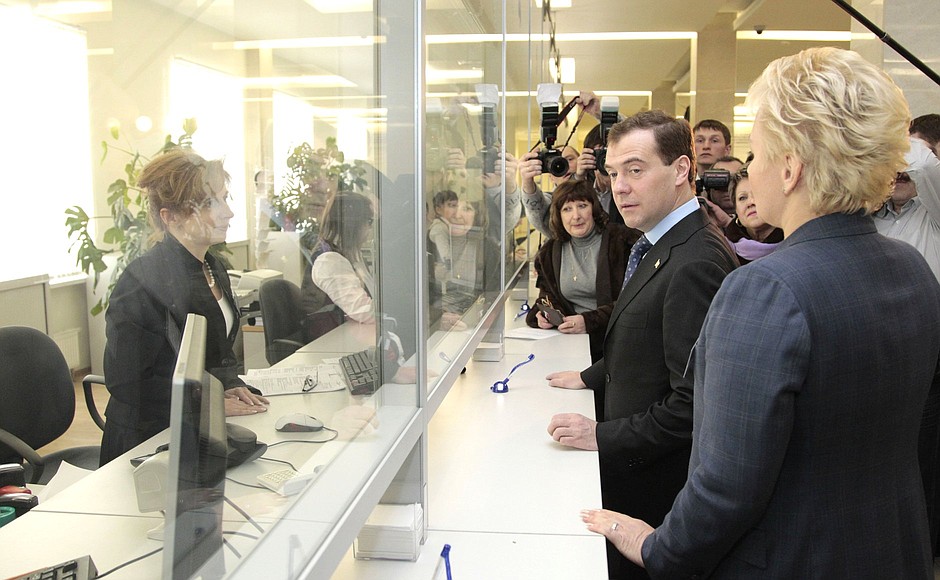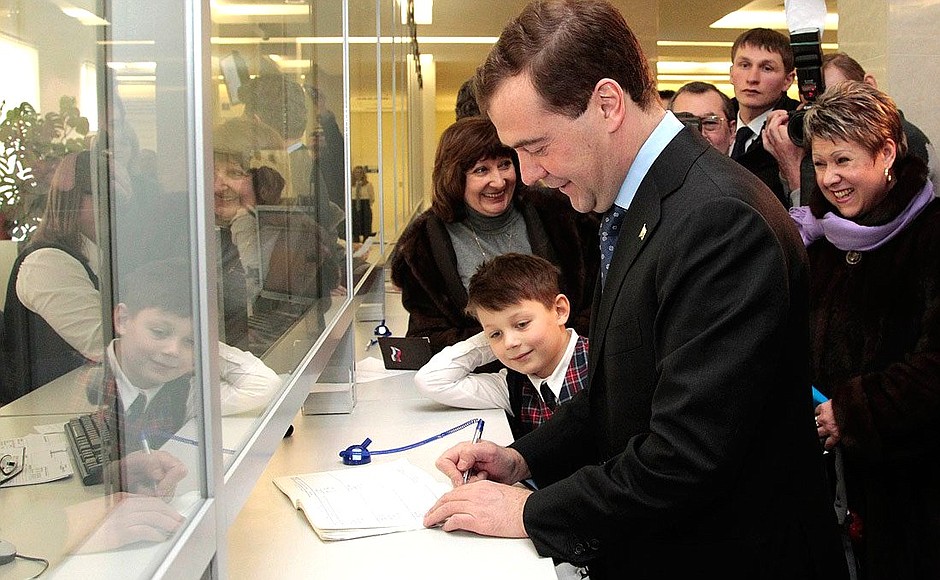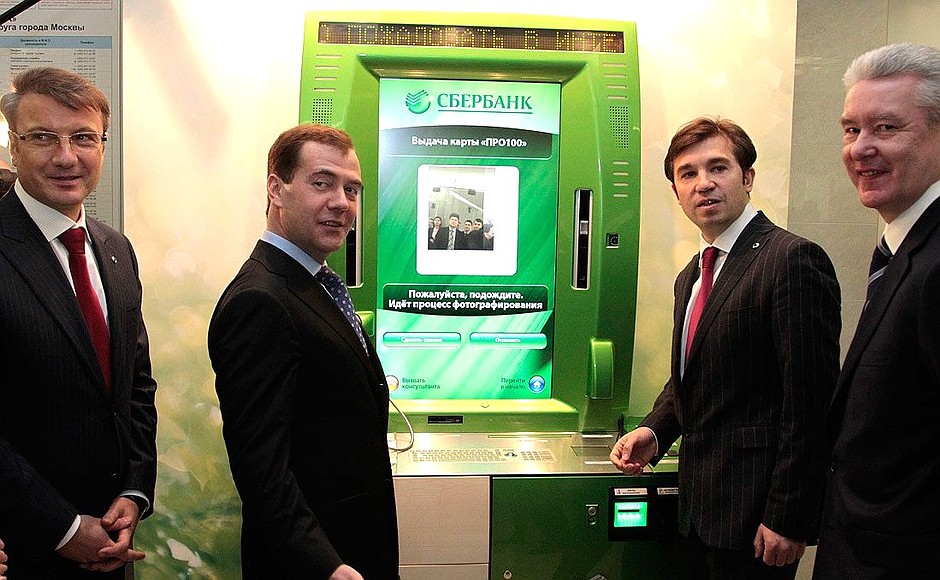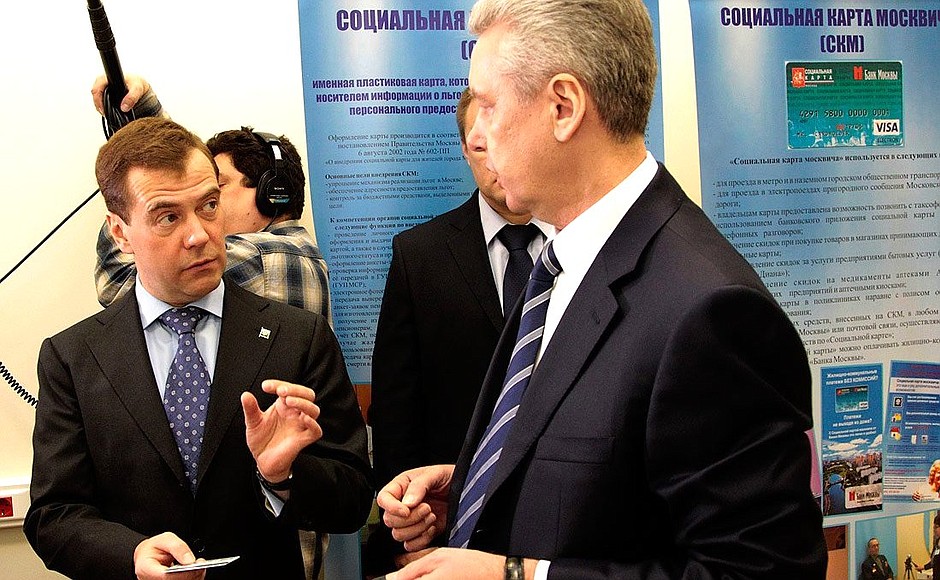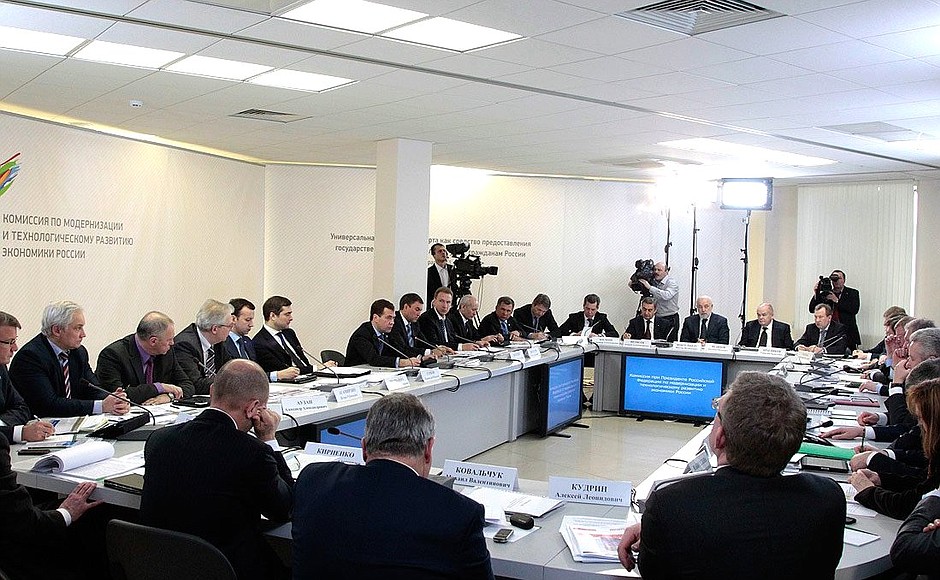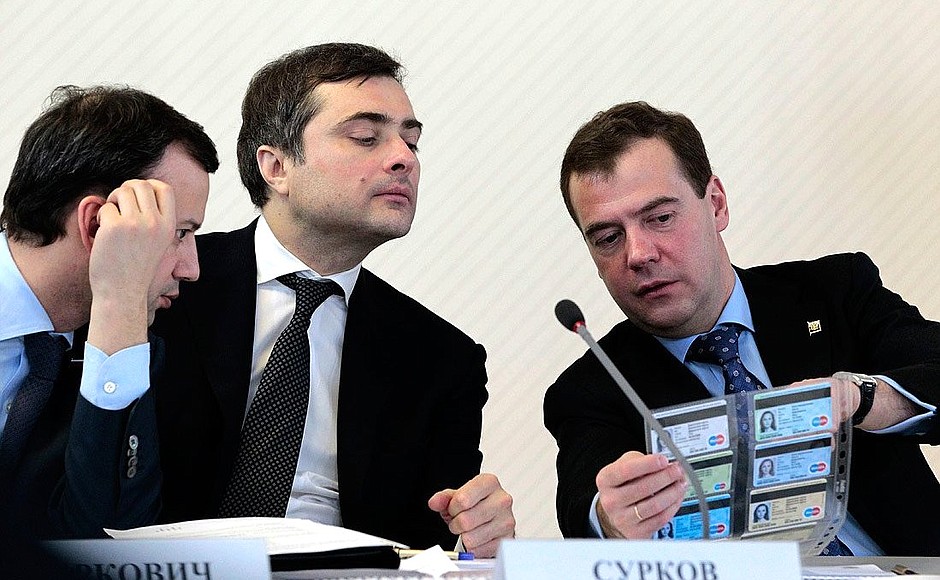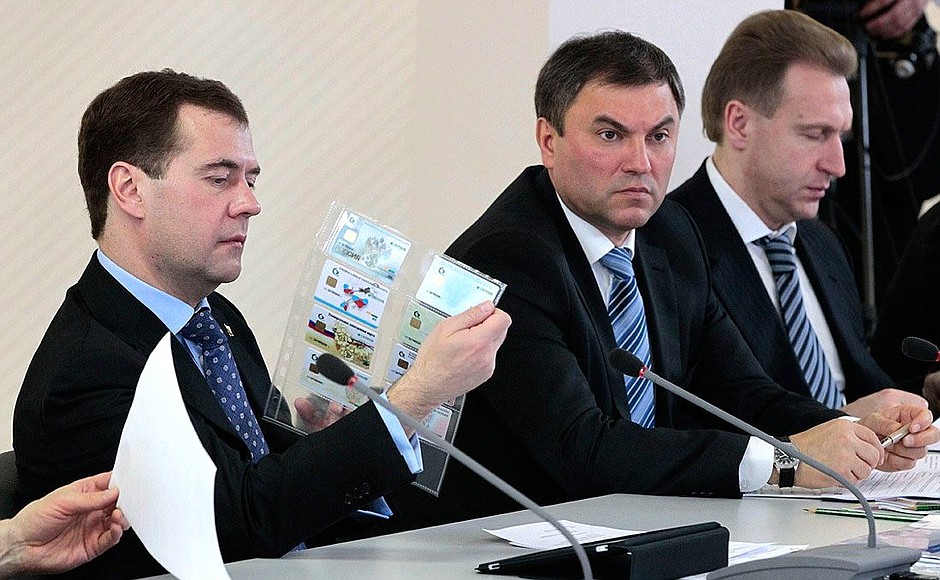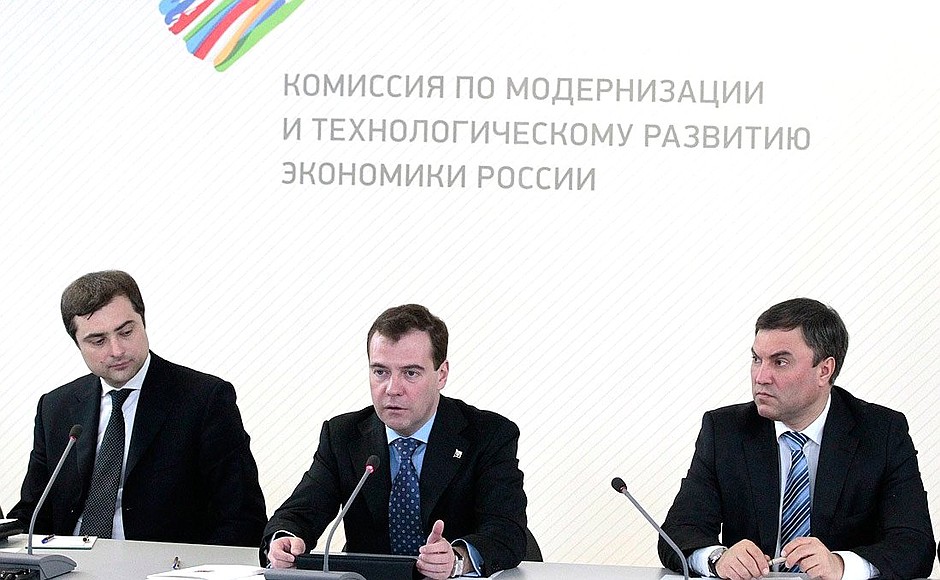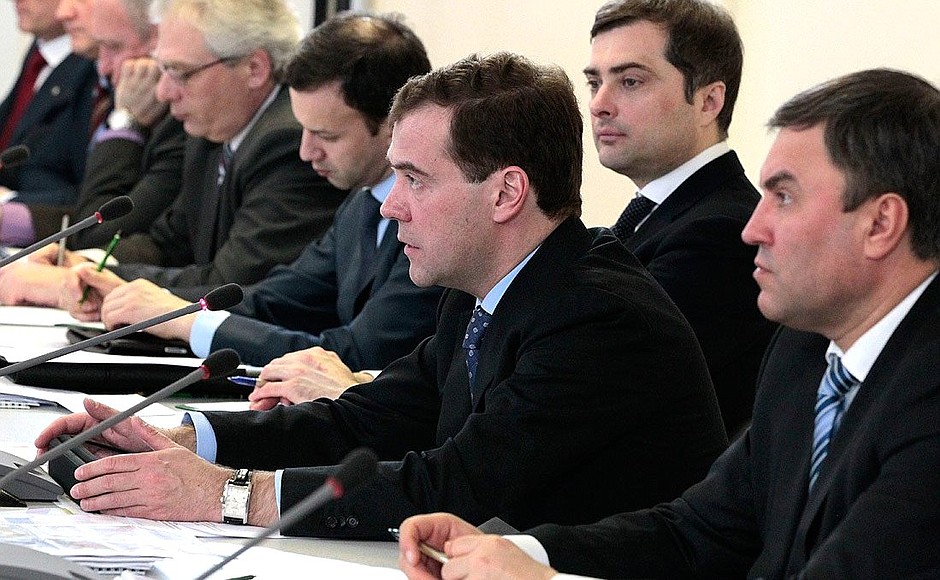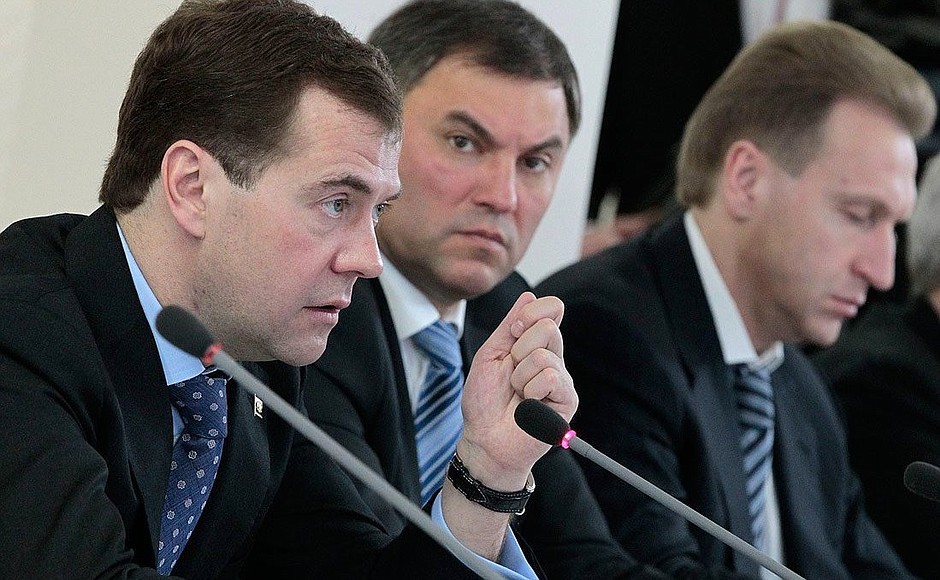The universal card will simplify paperwork, improve the quality of state services, make people better informed about their rights, and facilitate development of electronic payments. People will be able to use the card as a bank card and full-fledged payment instrument.
Mr Medvedev outlined a number of upcoming tasks for the card’s introduction. They include completing the process of putting the legal framework into place and developing the infrastructure needed for the card’s use, synchronising inter-agency cooperation procedures, and calculating all costs involved in the project.
The President instructed the Government to present by May 1 the estimates for the money needed to introduce the card throughout the country, and by summer of this year to complete work on the necessary legal documents.
The card, which will replace existing social services cards, will be issued to people in all regions and will incorporate such functions as compulsory medical and pension insurance, student ID document, transport card, and bank card.
Before the meeting, Mr Medvedev visited the Multipurpose State Services Centre in one of Moscow’s districts, saw the one-stop service at work, and looked through a presentation on the universal electronic card as a means of providing state and municipal services to the Russian public.
The President saw demonstrations of the card’s various uses in public transport, the healthcare and education facilities, retail sector, provision of state services in electronic form, and paying housing and utilities bills and fines.
* * *
President of Russia Dmitry Medvedev: Colleagues, the subject on our agenda today is a narrow topic at first glance, but as far as its social impact is concerned it is perhaps one of the most important matters to have come before us. I am referring to the introduction of a universal card for our citizens. I think there is no need to explain why we want to do this. It will give people a completely different quality of interaction with the state authorities and the various state agencies, offer new opportunities, make it easier to make tax payments and purchases, get updated about what is happening with their accounts, and, quite simply, it will integrate us further into the digital world in the broad sense of the term. In other words, it would take the digital culture in our country to a radically new level, make people feel more protected and secure in their dealings with the state authorities, and make it much easier for them to enter into various kinds of contact with the state.
People will be able to use this universal card not just for making payments and as a communication channel with the state authorities, but also as a full-fledged payment instrument that they can use in Russia and abroad.
We looked just before at all of the different possibilities this universal electronic payment card offers. The range of possibilities is impressive. We need to do everything possible to make sure that the card we introduce will be genuinely universal in the full sense of the word. It has to be a universal financial instrument that can be used in Russia and abroad and not some purely home-grown product that would not be recognised in other countries. We have already had that sort of experience. We have already had purely Russian cards that were accepted only by a limited number of banks. But you know how those experiments ended, and all of those cards ended up going out of circulation. We therefore need to make sure that this card is properly universal.
As far as the next steps to take are concerned, we first of all need to complete the process of putting the legal framework into place. I know that the documents are already largely ready. If there are still any fundamental differences to be ironed out, let’s discuss them here and now and settle them. All of the documents need to be adopted by summer. You can consider this a presidential instruction.
I am referring to the law on electronic digital signatures. This document has already been sent to the State Duma. A number of government resolutions on the technical standards for the universal electronic card, including the tangible medium itself and the technical standards for electronic applications are in the process of approval at the moment, as is the document setting the procedures for issuing the universal card.
I want to say straight away that we must act rather fast and not wait just for this or that product to be developed here within the country. We need to try to make a real jump up in quality. As possibilities for manufacturing this or that integral component of the card in Russia emerge we shall decide on their use and make the appropriate changes, but all other considerations are secondary, in my view.
Second, we need to develop the infrastructure needed for the card’s use. Each region must have sufficient equipment that is simple and user-friendly. We need to make sure that ordinary people will have quick and easy access to it. We do not want the queues we see in offices for getting this or that document to turn into queues at the terminals used for these universal cards. In other words, we will need to manufacture these terminals in rapid time, but we already have experience in this. Banks and other organisations already develop and install terminals, and most of them are based on Russian designs and Russian media, which is good.
There is another matter that is perhaps even more important given that the most convenient thing about these cards is that you can use them for dealings with the state authorities and companies via your personal computer. We need to develop the appropriate identification system, and at the same time, we need to ensure that these personal data and electronic digital signature reading devices are inexpensive. As for the software, we plan to make it free, and this is something for the state authorities to work on. The Telecommunications Ministry has been instructed to coordinate this work.
It is important to make the card issue procedures as simple as possible, specify the documents required, and make provisions for it to be used electronically. Of course, we must not forget about those of our people who are not very used to using modern technology. We need to launch a large-scale instructional campaign so that everyone will know everything they need to about the card, the services it offers, and how to use them.
Third, we need to collate the information from various agencies and synchronise the inter-agency cooperation procedures, which will need to be adapted to working with the card. Of course, we also need to make an effort to protect personal data from possibly being spread and used for other purposes. It must be admitted, though, that there is already a huge amount of personal information circulating in the worldwide web, and so far, no country has found really effective means for protecting it. We therefore must not let the personal data protection issue in itself stop us from pressing ahead with introducing these cards, and I want you all to remember this, including the agencies responsible for this protection.
The planned card that we are examining will offer a wide range of possibilities, both existing services and new ones too. We just looked through the presentation of these various possibilities. One of the ideas that I think potentially very interesting indeed is that of combining the card, with all of the services it offers, with a person’s driver’s licence integrating them into a single medium. This would give us a truly universal document that would make it possible not just to make purchases and all sorts of payments, but also travel around the country.
Another idea I think very promising is that of using the card as a means for simplifying registration procedures for people when they move around within our country’s borders. This will make things easier for our people, and, to be honest, it will also make life easier for the law enforcement agencies too. These possibilities are also something to keep in mind.
We need to synchronise nationwide the introduction of all of these services, from tax payment and medical services to more advanced services of the kind I just mentioned, so that people in all parts of the country can make use of them throughout all of Russia. The existing cards that have been developed are very convenient. I saw the various possibilities that the Moscow social services card, for example, offers pensioners and schoolchildren. This is all very impressive, and it is indeed an example of how we can use modern technology to pay for public transport, use the cards in schools, and obtain senior citizens’ entitlements. But at the same time, cards of this sort lose their whole meaning as soon as a person leaves the region where they were issued. The only exception is perhaps if they are combined with bank cards and can be used to pay for goods and services. But these cards cannot be used in other regions for medical services, tax payments, and various mandatory state fees.
The task is therefore to extend this kind of card to the whole of Russia, because only then will it be universal and only then will it be of real interest to our people. But this will require the regions to draw up plans for introducing the card. Some of our regions already have good experience in introducing this kind of card. I mentioned Moscow’s card just now, but similar systems also exist in Astrakhan Region, Bashkortostan, and Tatarstan, as well as some other regions, and their experience – both positive and negative – should be taken into account too. You need to calculate the project’s whole cost. The banking and financial institutions have obvious interest in the project and are its main advocates. They will support it, of course, but at the same time, we also need to work out how much public funding will be required. I therefore instruct the Government to present the estimates for these costs by May 1, so that we can earmark the funds in next year’s budget.
There is one other subject that I mentioned in passing before. Obviously, the chip that will be used to store the personal data in the card, and the personal data protection means it will contain need to be certified. This will take some time. I think we need to continue the certification work, but we must not let it hold up the overall project. We need to work along two parallel tracks here: developing the social services card itself, and developing the chip that will be used in it. I think it is ultimately not so important whether it is a purely Russian chip or whether it will have some kind of combined possibilities.
We also need to think about the card’s design, because ultimately, we are talking about a universal card that will be like a second basic ID document for our citizens. Indeed, given the kind of possibilities the card will offer it could well become the main form of ID that people use. The internal passports that people have will become more of a purely official document used in a limited number of circumstances, and people will use this card as their main form of ID in their daily lives all around the country. Its design is therefore important and should be of a worthy standard.
In short, we are ready to start carrying out this big and socially very important project. Its result will have a real impact on people’s lives and on the dealings between the state and its citizens. This is therefore very important work indeed. I am sure that the introduction of this system will make life easier for millions and millions of our people.
